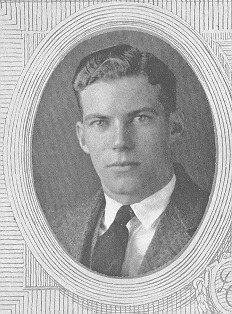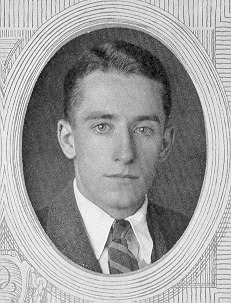Phi Beta Kappa – Original Student Members
Born in Chester, South Carolina to Z. V. and Kate Gaston Davidson, Robert Franklin Davidson attended Davidson College where he was Salutatorian of the Class of 1923 and was the first student initiated into the Davidson chapter of Phi Beta Kappa that year. He entered the Louisville Presbyterian Seminary in Kentucky in 1925 and while there was chosen as a Rhodes Scholar from South Carolina. He completed his training at Oxford University in 1928 and later obtained a Ph. D. in Philosophy at Yale University. He was awarded honorary Doctor of Laws degrees from both Limestone College and Davidson College.
Davidson joined the faculty of the University of Florida at Gainesville in 1946 and became chairman of the department of Humanities. He was elected dean of the faculty of St. Andrews College in North Carolina in 1962. He remained there until 1972 when, as Dean-emeritus, he retired to Gainesville.
Davidson authored several books, the best known of which is Philosophies Men Live By, adopted as a text by over 100 colleges and universities. In 1984, St. Andrews published his autobiography, Adventures in Ideas and Values. Davidson was twice married, first to Mrs. Eve Carlton Davidson of Alabama, who died in 1978, and then, in 1979, to Mrs. Irmgard Kachel Close of Gainesville. Davidson died in May 1985.
William Arnett Gamble received his early education in his hometown of Macon, Georgia. Prior to entering Davidson College in 1919, Gamble was employed by the G. S. & F. Railway and was later secretary to J. M. Wells, pastor of the First Presbyterian Church in Wilmington, North Carolina. During World War I, he served with the U. S. Navy. Gamble graduated Phi Beta Kappa from Davidson College in 1923 and then attended Columbia Theological Seminary and Union Theological Seminary. He received his B.D. degree in 1926.
Gamble was the pastor of churches in Pinetops, N.C., Raymond, Miss., Charlotte, N.C., and Hollandale, Mississippi. He served as State Clerk of the Presbytery of Central Mississippi from 1956 to 1963. Gamble was a major in the Chaplains’s Corps, U.S. Army during World War II and served as chaplain of army posts in North Carolina and Mississippi. He published two books ÷ Ten Sermons for Ten Years (1940) and Trumpets of the Lord (1971).
Gamble married Elisabeth Moffitt Thames, a graduate of North Carolina Women’s College (UNC-Greensboro). Their son, William Arnett III entered Davidson College in 1945. Tragically, he was killed during his junior year in a motorcycle accident.
W. Gettys Guille was born in Athens, Tennessee to the Rev. George E. and Amy Gettys Guille. After graduating Phi Beta Kappa from Davidson College in 1923, Guille moved to Salisbury, North Carolina in 1926. He then began a 19 year career with Wachovia Bank, and later organized Builders Supply Company.
A trustee of Bryan College of Dayton, Tennessee, and the Reformed Theological Seminary of Jackson, Mississippi, Guille also served as trustee of Bethel College of Mercy at Lenoir and was director of the “Presbyterian Journal.” During his lifetime, Guille served as chairman of the Rowan Chapter of the American Red Cross, the Salisbury Community Chest, the Salisbury Chapter of Infantile Paralysis, and as chairman and member of the board of the Salvation Army for 39 years.
A lifelong member of the Presbyterian Church, Guille also served as state chaplain of the Gideon Camp organization. At the time of his death
in 1970, he was a member of the Franklin Presbyterian Church.
A native of Columbus, Mississippi, Dunbar Ogden, Jr. graduated Phi Beta Kappa and valedictorian of his class from Davidson College in 1923. He earned a B.D. and a Th.M. degree from Union Theological Seminary in Richmond, Virginia before holding Presbyterian pastorates in eight states.
During the 1950’s, Ogden served as president of the Greater Little Rock Ministerial Association in Arkansas. It was through this organization that Ogden became known as a civil rights pioneer and leader of the integration movement. In Little Rock on September 4, 1957, Ogden personally led nine black children in the historic walk through the mobs and up to the line of Governor Faubus’ National Guard placed in front of Little Rock Central High School to prevent is integration. A year later, Ogden took the Rev. Martin Luther King to the exercises at Central High where the first black student was graduating.
On “Freedom Day” in 1969, West Virginia State University awarded Ogden with an honorary Doctor of Humanities degree for his “courageous
steps which demonstrate his Christian philosophy, and which point up his belief in human dignity.” Ogden died in 1978.
After graduating Phi Beta Kappa from Davidson College in 1923, Hugh Hollingsworth Smith received his M.D. and M.P.H. (Masters of Public Health) from Johns Hopkins University. After completing his work at Johns Hopkins, Smith spent two years (1928-30) as instructor in medicine at Strong Memorial Hospital in Rochester, N.Y. He then began a twenty-five year association with the International Health Division of the Rockefeller Foundation (1930-54). It was during this time that Smith became the principal member of the scientific team that developed the yellow fever vaccine for the Rockefeller Foundation.
Yellow fever is transmitted by mosquitoes and can kill humans within five to seven days of being infected. Thanks to Smith’s discovery of the
vaccine, however, thousands of lives have been saved from this deadly disease. The vaccine first proved its effectiveness when in 1937 a deadly outbreak of yellow fever in Brazil was halted by the administration of the vaccine.
Before retiring as Associate Director of the International Health Division of the Rockefeller Foundation, Smith received the Cruz de Boyoca from the Republic of Columbia (1941) for his distinguished service in that country, and a citation from the War Department (1945), for his work in public health. In 1958, he was appointed Professor of Microbiology at the University of Arizona. He remained in Tuscon with his wife, Mary Royhl, and his two sons, Peter and Robert, until his death in 1995.
Text for this exhibit was taken from the alumni files at Davidson College. Exhibit designed by Molly P. Gillespie, Assistant to Davidson College Archivist. March 16, 1998.





